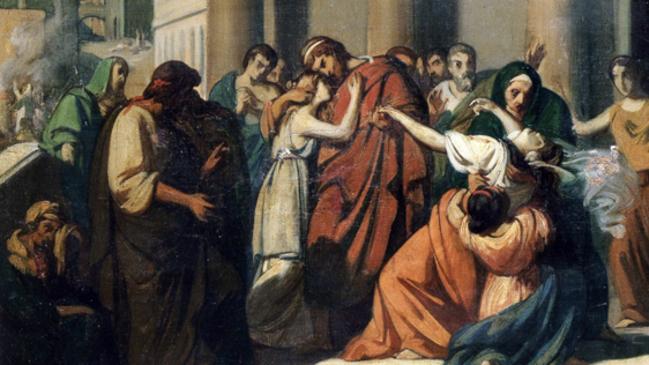Oedipus myth remade in Natalie Haynes Children of Jocasta
The story of Oedipus is a time-honoured tale, an ageless tragedy, a cornerstone of Western culture. Now it’s a novel.

The story — the myth, the legend — of Oedipus remains a time-honoured tale, an ageless tragedy, a cornerstone of Western culture. Many a common reader unversed in Greek drama or averse to psychoanalysis can name one or both of Oedipus’s unnatural acts.
Those who immerse themselves in Sophocles’s most famous version, King Oedipus, whether following events on the page or the stage, experience a play of many parts: a searing character study, a perverse whodunit, a gripping journey into darkness and an illuminating insight into the human condition. It’s no wonder Aristotle proclaimed it the most perfect Greek tragedy.

English writer Natalie Haynes, an acclaimed classicist and author of The Ancient Guide to Modern Life, has taken the Oedipus story and rewritten it as a novel. Purists and sceptics may scorn the endeavour: why tamper with perfection? But, as with this year’s other novelistic treatments of Greek myth — chiefly David Vann’s take on Medea in Bright Air Black and Colm Toibin’s channelling of Clytemnestra and her vengeful offspring in House of Names — The Children of Jocasta sees Haynes not so much recasting a seminal tale as reinterpreting it, exploring and expanding by way of different viewpoints.
The two main viewpoints belong to Jocasta and her daughter Ismene, and Haynes’s main source material is the first and last of Sophocles’s Theban plays, King Oedipus and Antigone. As Jocasta plays second fiddle to Oedipus in the former and Ismene is overshadowed by older sister Antigone in the latter (allotted a mere 60 lines), Haynes’s novel is something of a salvage operation, a noble attempt to push the sidelined to the forefront and give their hitherto untold side of the story.
It is an ambitious feat but one that Haynes admirably pulls off. To make it work she flits between her heroines’ lives, devoting one chapter to Jocasta and the next to Ismene. Both are 15 at the beginning of their stories, with Jocasta starting out as a naive young bride to a “half-dead” king, and Ismene, years later, making her way as the “cursed daughter of cursed parents”.
Despite serving up warring brothers, wrestling boys, a complex Oedipus and, at the end of each strand, Jocasta’s brother Creon muscling in and seizing the throne, Haynes’s novel is powered by feminine force, its well-drawn mother-and-daughter leads dominating their narratives and commanding our attention.
As befits Greek drama, the book begins ominously. Ismene is roaming the quiet corridors and empty courtyards of the palace at Thebes. She passes a strange veiled man, feels a sharp pain in her side, and notices the manuscript she is carrying is coated in something red and sticky. It then dawns on her: “Someone had killed me.”
Haynes leaves us with this cliffhanger and switches — and rewinds — to Jocasta and the early, lonely days of her loveless marriage to ageing, distant King Laius. An heir is needed and she gives birth to a boy. Immediately afterwards she is surprised to hear of a prophecy that says the king will be killed by his son, and is then devastated when her child is whisked away and she is told he didn’t survive.
In their separate stories, the two women find themselves captive in the royal residence and at the mercy of men. Ismene recovers from her stabbing, waits for the culprit to be caught and wonders if a plot is thickening in which her murder may be a means of destabilising the kingship.
Jocasta endures years of mourning and ostracisation until the day a handsome young man called Oedipus turns up, bringing welcome news about Laius’s death and offering the chance of future happiness.
The novel’s title refers to sisters Ismene (“Isy”), Antigone (“Ani”) and their brothers Polynices (“Polyn”) and Eteocles (“Eteo”). But of course Jocasta’s other child is her husband, Oedipus (mercifully not nicknamed “Oedi”). When the terrible truth comes to light in Sophocles’s play, Jocasta hangs herself and Oedipus blinds himself: “On man and wife — falls mingled punishment.”
Haynes lessens the blow and thus the effect by completely removing sin, shame and punishment. The couple have what amounts to a marital tiff, which ends badly but not quite as badly as in the original. Similarly, Oedipus isn’t compelled to gouge out his eyes.
This makes for a curiously downbeat climax to Jocasta’s story after an electrifying build-up. Fortunately, Ismene’s first-person account is, by turn, exciting and affecting, dealing as it does with impious crimes, clandestine interments and a hard-won realisation: “I grew up believing that my mother did not love us enough to stay alive. But the opposite was true. She loved us so much, she died to protect us.”
Haynes peppers her novel with many successful modifications: her Sphinx is a gang of mountain-dwelling brigands; Eteocles, not Polynices, is left to rot “unmourned, unwept and unburied”; and Antigone meets a less ignoble end. To authenticate and enrich her text, Haynes blends in un-italicised Greek terms and slang, plus an array of requisite rituals, ceremonies, conspiracies and violent deeds. Whether controlled by the gods or acting independently, Haynes’s characters convince and their fates matter.
In her afterword, Haynes describes the Oedipus myth as “a relentless piece of storytelling”. She has harnessed that energy and retooled the story and the result is a mesmerising work of beauty and brutality.
Natalie Haynes is a guest at the Sydney Writers Festival this weekend.
Malcolm Forbes is an Edinburgh-based critic.
The Children of Jocasta
By Natalie Haynes
Mantle, 304pp, $29.95


